Text
highlight of my elden ring play session today; bounced around between the haligtree and farum azula a bunch before sticking with and cutting through farum azula until i saw the godskin duo boss room and waffled around just outside before heading back to the haligtree and rocking loretta’s shit instead
#i got to both of those areas for the first time today and figured eh why not let’s get to the halfway points#and then just seeing the godskin duo room made me nervous lol#elden ring#salty talks#i have heard nothing good about the godskin duo so i am Afraid#but im also a little fuckoff overleveled so we’ll have to see when i give em a shot in a day or two#loretta is always fun. i messaged my friend like ok im gonna give loretta one shot today before stopping#and then one shot is all i needed sorry queen#funny in hindsight cuz the version in liurnia took me ages to beat so im a lil disappointed that it only took one try for the real thing#on the flipside i like the godskin apostle and i did immediately spam sleep pot on the prison town noble#soooo not really looking forward to the duo#but i have cornered myself in the sense that ive killed every other boss#but the ashen capital ones and malenia and godskin duo and maliketh and mohg
1 note
·
View note
Text
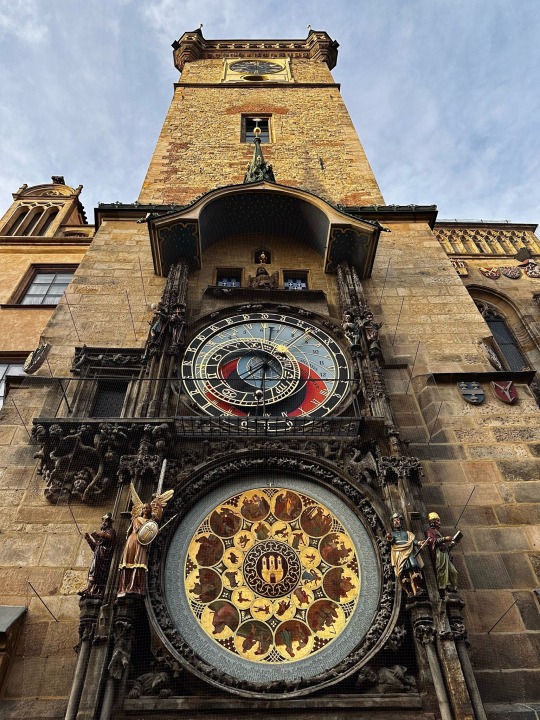
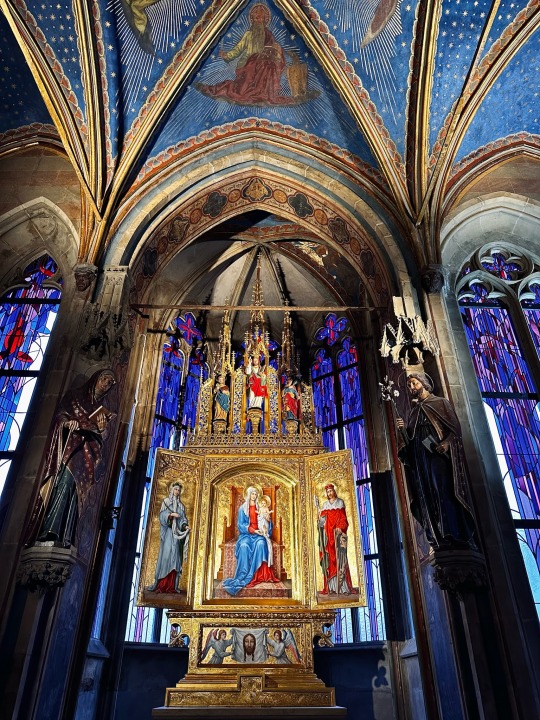
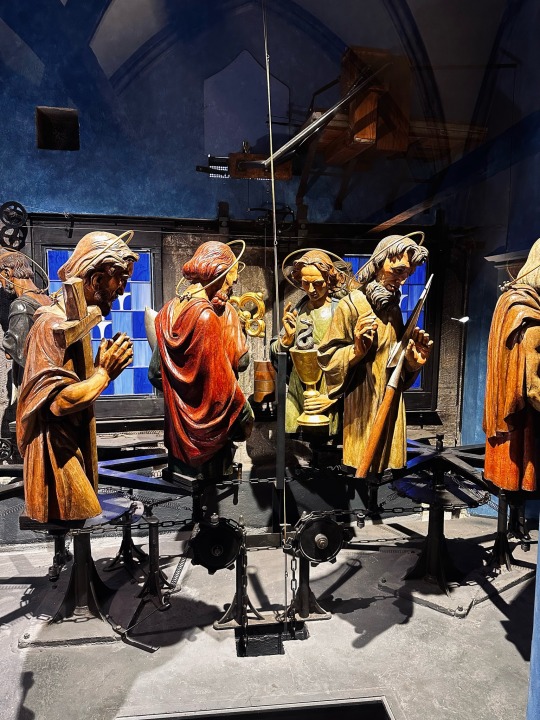
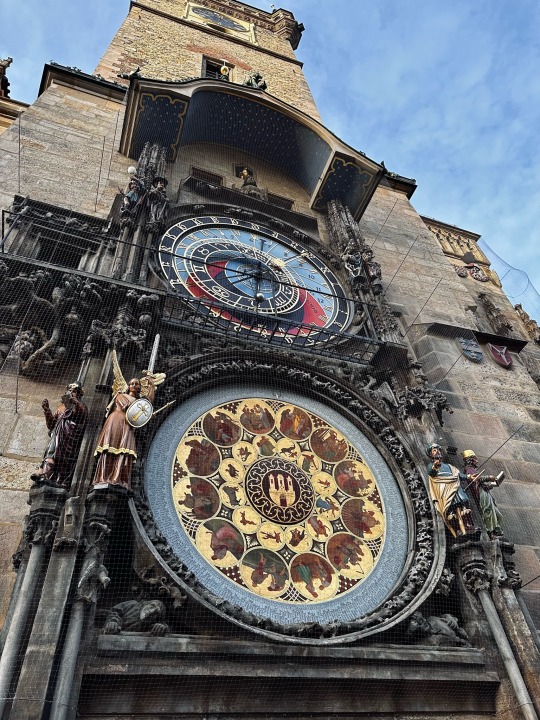
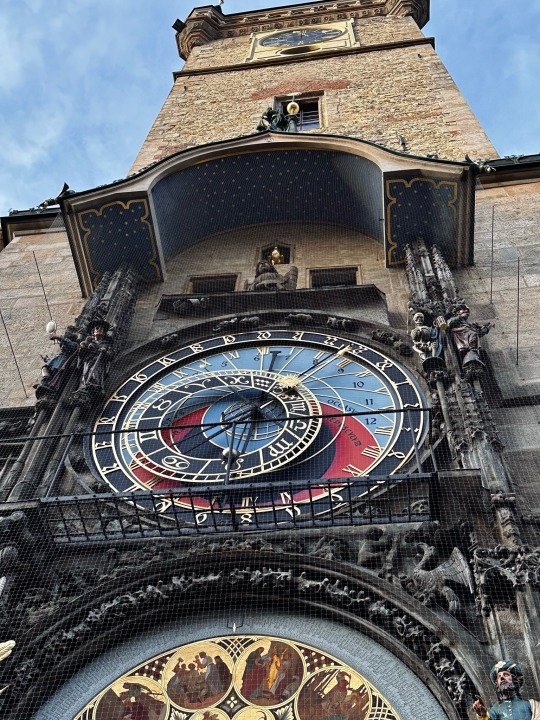
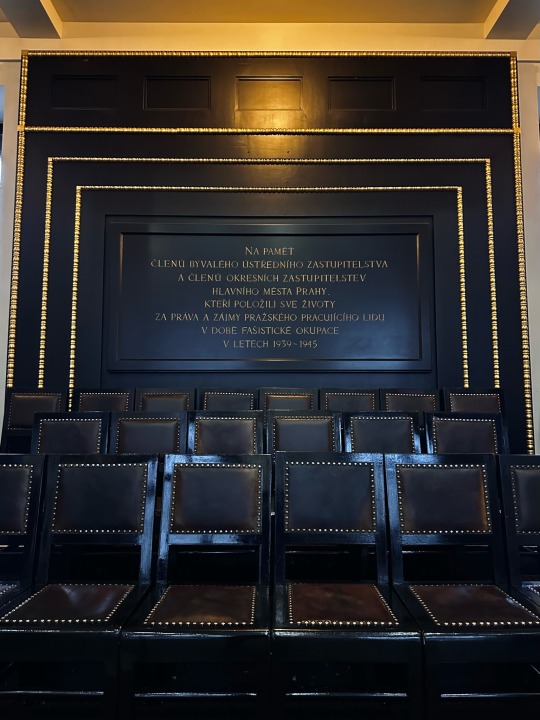
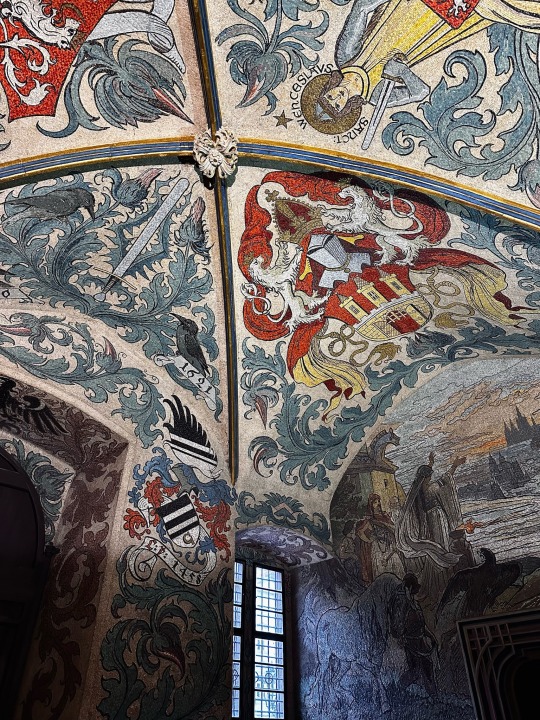
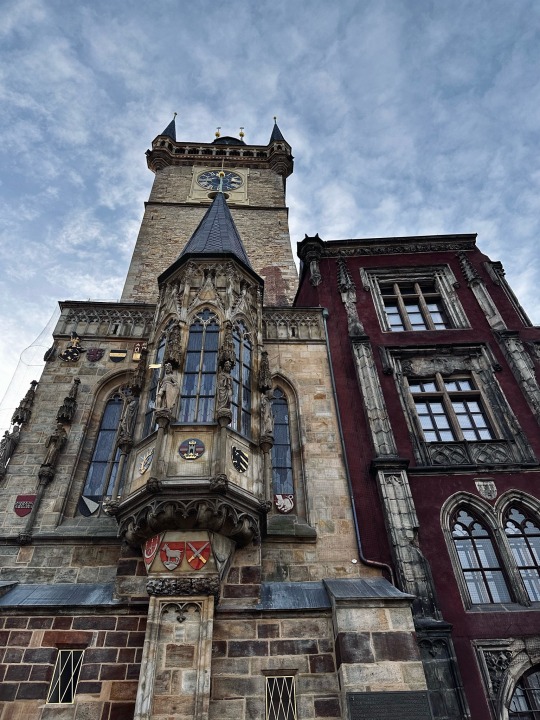
The Prague astronomical clock is a medieval astronomical clock attached to the Old Town Hall in Prague, the capital of the Czech Republic.
The clock was first installed in 1410, making it the third-oldest astronomical clock in the world and the oldest clock still in operation.
The clock mechanism has three main components – the astronomical dial, representing the position of the Sun and Moon in the sky and displaying various astronomical details; statues of various Catholic saints stand on either side of the clock; "The Walk of the Apostles", an hourly show of moving Apostle figures and other sculptures, notably a figure of a skeleton that represents Death, striking the time; and a calendar dial with medallions representing the months. According to local legend, the city will suffer if the clock is neglected and its good operation is placed in jeopardy; a ghost, mounted on the clock, was supposed to nod its head in confirmation. According to the legend, the only hope was represented by a boy born on New Year's night.
Prague astronomical clock
Old Town Hall
Prague, Czech Republic 🇨🇿
#prague#czech republic#europe#beautiful architecture#arhitecture#old city#old town#town hall#astronomy#astrology#clock#gothic atmosphere#goth architecture#history#astronomical#artists on tumblr#photographers on tumblr#original photographers#dark academia#light academia#naturecore#cottagecore#fairycore#interiors#goth aesthetic#cozy academia#cozycore#photography#atmosphere#photo
306 notes
·
View notes
Text


【ELDEN RING】 manhole in Leyndell royal capital.
P1 Nastim(twitter sosnastim) and Morgott. P2 My characters Miruku and Godskin Apostle(Slim).
#elden ring#elden ring art#elden ring fanart#tarnished#godskin apostle#elden ring tarnished#godskin#tarnished miruku#elden ring comic#morgott#Miruku (oc)
186 notes
·
View notes
Text

Sao Paulo, Brazil: São Paulo is the most populous city in Brazil and the capital of the state of São Paulo. Listed by the GaWC as an alpha global city, São Paulo is the most populous city outside of Asia and the world's 20th-largest city proper by population. Additionally, São Paulo is the largest Portuguese-speaking city in the world. It exerts strong international influences in commerce, finance, arts, and entertainment. The city's name honors the Apostle, Saint Paul of Tarsus. Wikipedia
103 notes
·
View notes
Text
Scrags Alone
Something I've been thinking a lot about is how terribly lonely Scrags' life seems to be outside of the Solve It Squad? Like, throughout Grunch every other member of the Squad interacts with someone(s) they have an at least vaguely positive relationship with from some other area of their life. Esther has Kirk. Gwen and Orlando may not be actual friends, but he was still a real connection she was able to call upon and capitalize on (and also her relationship with her children, while never shown on stage, is a major thread running through the whole play). Even Keith, whose life has always come across as this sort of horrible dark void, has an ex-girlfriend resurfacing with nothing but genuine fondness for those teenage memories. But when it comes to Scrags? No best friend, old friend, work friend... the only thing that comes calling for him is the gaping absence represented by the PawPaw Chair. He literally has to do his big duet with a work acquaintance of Gwen's. And it kinda' breaks my heart.
(Not to mention how Esther, whom he seems to consider his closest friend inside the Squad--though I think its actually Gwen and I will die on the hill of the importance of their relationship--goes out of their way to emphasize the limitation of their friendship.)
And then I think about how it all goes back to Cluebert, the glue of the group, the dog Scrags believes was the reason he was ever able to befriend the Squad in the first place. When the Demonic Apostle killed Cluebert, he killed the only way Scrags thought he could connect. And our boy just... never tried to find something new.
So, uh, I guess, shout-out to TCB for taking Shaggy fucking Rogers and saying "we can make this devastating!" Cheers, boys.
#scrags#benji scragtowski#benjamin scragtowski#benji scrags scragtowski#solve it squad#how the grunch cribbed christmas#htgcc
185 notes
·
View notes
Note
How do you rank the various freak ass gods in elden ring so far. Just in vibes and such.
ok now that i know them all:
godfrey: not at all what i imagined. very funny how he has a furry jojo stand preventing him from going beast mode. 5/10, ultimately just a big guy whose wife took his godhood in the divorce
godwyn: creepy. he looks terrible. 7/10 for being interestingly yucky (both bodies).
godrick: total scrub, which is very funny. once you see his ungrafted corpse, he really is the runt of the litter. 6/10 for yucky points.
godefroy: somehow a bigger scrub. 4/10 for no dragon
morgott: the quintessential fromsoft epic grandpa character. huge bastard the first time you meet him. the next few times feel less dire. resourceful little bastard, taking the capital city like that. 6/10
mohg: whats his problem lol. i love a boss that blabbers at you as you fight. NIHIL. i see the dlc semi-explains wtf he was up to so maybe ill find out some day. 7/10. good fights. semi-tricky.
radahn: WOULD. 9/10 fun fight too. all of your friends come in with everything for a HUGE murder!
malenia: the lady maria fight but if it sucked. her strat is to do biological warfare on you when she loses in hand to hand combat fair and square. 4/10 at least she looked cool.
miquella: dead (?)/10. sir not appearing in this game (so far). seems to be trying to fix problems instead of causing them, which is a nice change of pace. doing a bad job, though.
rykard: 8/10. freaky weird design, stupid motives, and a fun fight gimmick. TOGETHARRRR WE WILL DEVOURRR THE VERY GODS!! or whatever.
ranni: 6/10. shes fine. she does nothing for me. kind of a neat design i guess.
radagon: this is all your fault. 7/10 kind of a lame fight.
marika: what is her problem lol. 8/10 bc i love how she causes so many problems for no reason
the gloam eyed queen: pretty sure i know who this is. what the hell is her game. 6/10, inscrutable motives and the godskin apostle fights are just ok
30 notes
·
View notes
Photo

The Journeys of Paul the Apostle
The journeys of Paul the Apostle, as the New Testament relates in the Book of Acts, started with his conversion experience on the way to Damascus, after which instead of seeking to thwart the growing Christian movement, he helped spread it. His four journeys by land and sea across great lengths of the Mediterranean and over vast expanses of land in Asia and Europe totaled over an estimated 16,000 km (10,000 mi).
The Journeys of Paul the Apostle, c. 55 CE
Simeon Netchev (CC BY-NC-ND)
Paul's First Missionary Journey
After persecution in Jerusalem, Antioch was one of the places to which Christians fled, and it was from there Paul began his first missionary journey. Annexed by Pompey the Great in 64 CE and made the Roman provincial capital of Syria, with an estimated population of 250,000, Antioch was one of the primary cities of the East, along with Alexandria and Constantinople. Located at the northeast end of the Mediterranean on the Persian Royal Road, Antioch benefited from its location at the end of the Silk Road and its proximity to Greece, Anatolia, and Italy. As Hughs and Jones mention, not only was "its wealth derived from being a center of civil, military, and later ecclesiastical administration of much of the Near East but also from its position on the commercial road from Asia to the Mediterranean" (103).
Besides its own wine and olive oil production and as a center for the fulling of cloth products, silk from China, lapis lazuli from Afghanistan, dye-works from the Levant, and weaved silk from Damascus could all have found their way through Antioch for distribution throughout the northern Mediterranean areas. As it lay on the Orontes River and at the edge of a fertile plain, Antioch communicated commercially with the harbor of Seleucia 26 km (16 mi) downstream on the Mediterranean. As common travelers in ancient times hitched their rides on merchant vessels, the water portion of Paul's trip was aboard a cargo ship performing trade transactions. Thus, it was at Seleucia that Paul boarded a cargo ship to the province of Asia, stopping at the island of Cyprus.
Cyprus, with a prominent location at the eastern end of the Mediterranean, was also known for its wine and olive oil production. A scenario for trade would have been a combination of Eastern goods loaded alongside refined and agricultural products accumulated at Antioch. Then, with a stop at Cyprus for partial distribution, Cyprus' products would have been added for final distribution in Asia.
With fellow evangelist Barnabas and Barnabas' nephew, John Mark, Paul first landed at Salamis on the eastern end of Cyprus after leaving the port city of Seleucia and sailing west toward Asia. Like with many of his subsequent stops, Paul first visited the local synagogue, attempting a conversion of the Jews to Christianity. From Salamis, heading west, walking nearly the length of Cyprus, Paul and Barnabas came to Paphos, their point of departure for Asia. At Paphos, the proconsul Sergius Paulus would become a convert.
Paul the Apostle's First Missionary Journey (c. 46-48 CE)
Simeon Netchev (CC BY-NC-ND)
Heading to Asia from Cyprus, Paul's ship stopped at Perga in Pamphylia, in southwestern Turkey today. From Perga, John Mark departed for Jerusalem as Paul and Barnabas pressed on into Asia. At their first stop in Antioch of Pisidia, at the synagogue, Paul preached the history of Israel as he weaved in the story of John the Baptist and Jesus of Nazareth, said to be a descendant of David, as the resurrected Savior, son of God. Though Paul and Barnabas initially gained Jewish and Gentile converts, a faction of opposing Jews expelled them from the city.
At Iconium, with similarly mixed results on learning of a plot to kill them, Paul went on to Lystra. As many in Lystra were worshipers of gods and their idols, Paul preached they should turn from worshiping "things" to worshiping the "living God" (Acts 14:15). When some hostile Jews came from Antioch and Iconium and won the crowd over, both groups stoned Paul. Thinking he was dead, they dragged Paul to the outskirts of the city. When some brethren came to retrieve the body, remarkably Paul had recovered and went back into town. The next day, Paul traveled east for Derbe. With his mission ending on a more positive note, large numbers rallied at Derbe to Paul's message. Deciding to head home, retracing their steps through Lystra, Iconium, and Antioch, after appointing elders in each church, the apostles went on to Perga; then, after preaching there a bit, they boarded a ship for a short junket west to the port city of Attallia, then from there they sailed back to Seleucia, then traveled up along the Orontes to Antioch.
Continue reading...
17 notes
·
View notes
Text
the other day I was talking to my wife about how amazing Stormveil Castle and Godrick himself are as devices for giving players a bunch of foreshadowing into major players and events in the lore long before we’d otherwise have a chance to learn about them.
for starters, the sheer amount of sacred relics and random trinkets Godrick took with him, many of which we find strewn around Stormveil, serve to introduce us to a ton of stuff, including both the concept of the godslaying Black Flame and Marika’s capacity for illusion and deception. The Mimic’s Veil item description establishes the latter point after making it clear that Godrick stole a bunch of shit when he was run out of town in Leyndell.
When Godrick was hounded from Leyndell, the Royal Capital, this was one of a multitude of treasures he took with him. Also known as "Marika's Mischief".
‘mischief’ isn’t solely defined as playful trickery. Merriam-Webster includes “a specific injury or damage attributed to a particular agent” as one of its meanings, which is where bands like Ghost get lyrics like “this wretched mischief” when referring to sin being punished by plague, and where we get colloquial phrases like “don’t do yourself a mischief”—don’t get hurt, basically. this item isn’t saying Marika is a goofy prankster or that she’s a malicious liar (though I do think deception and manipulation are major character traits of hers that she either encouraged in or passed onto many of her descendants), but it’s saying this is something she caused to come into being, is responsible for, or is otherwise connected to. this is for many players the first implication we get at any kind of proper characterization for Marika, and it’s just tucked away in a random room you might have rushed through in order to avoid fighting the knight that guards it in an enclosed space.
in addition to learning the name of the Godskin Apostles from the Godslayer’s Seal, you also find the Godskin Prayerbook in Stormveil, which establishes the concepts of both black flame (especially notable if you started as a prophet and already know there’s one kind of fire magic, and that it’s considered a taboo) and the fact that you, or somebody else, can kill gods with it. you also get told the book is bound from human skin, which is a really common writing convention used to establish that a faction or type of magic or magical practitioner is a Bad Guy in some way—bad guys make stuff out of people, good guys make stuff out of stuff, or so this trope is used to imply.
Prayerbook bound in supple skin. Incantations of the god-slaying black flame are written within.
and those are just two items! a new player usually meets their first omen in Stormveil and you can learn a little bit about omens from the Omen Cleaver’s item description, the misericorde introduces the concept of war-surgeons (I didn’t realize Varré was one until I got the war surgeon’s set in Moghwyn, so that was an extremely impressive long-form setup and payoff for me), you get your first update on Godwyn’s status since the opening cutscene from the Prince of Death’s Pustule and from dialogue with Rogier, who also introduces glintstone to anybody who didn’t start as an astrologer or prisoner, and (while this doesn’t happen in Stormveil specifically) if you talk to Kenneth Haight about Godrick he even name-drops Malenia! Godrick is so fascinating to me (he’s always been a huge “this guy sucks, I adore him” character in my eyes in the most positive way I can convey that) and the way he’s used in the story is so fascinating. Godrick and grafting and so many things about him may be entirely contained to Stormveil and Limgrave, to the point that it can feel like he doesn’t have much of an affect on the wider world at large, but I think that’s the point: realizing the scope of his vision and strength are so limited and seeing how much bigger the world is based solely off the things he stole is such an effective way to make his corner of the world feel tiny by making you realize, or at least wonder, just how big the rest of the world really is. it’s so well done and thinking about all this stuff—and I even left out some stuff, like how you potentially learn about both living jars and the Crucible for the first time in Stormveil, too—just makes me really appreciate Stormveil’s environmental storytelling all the more.
8 notes
·
View notes
Text
Thomas Malthus, who is often interpreted as arguing for population control to overcome economic limits, actually invoked the threat of limits to advocate for growth, arguing that scarcity is a natural fact, and that only a growth-based economy could overcome it. In this way, Malthus was one of the first ‘apostles of growth’. Since then, both neoclassical economists and elites sought to further cement the idea that growth is needed to overcome natural scarcity as common sense. But scarcity is not a natural fact. Rather, scarcity, as well as the social hierarchies that limit autonomy and self-determination, are imposed by a capitalist system of production. As a corollary, degrowth is not about imposing limits on society according to natural scarcity, but about regaining autonomy to collectively create public abundance, and also deliberate and set limits. And this – collectively setting limits – is a key prerequisite for the formation of autonomous, democratic governance, as the Greek philosopher Cornelius Castoriadis argues in his work. Indeed, it is precisely capitalism – through alienating us from each other and from the abundance of the earth – which undemocratically imposes limits on us and makes it impossible for us to set our own. Thus, just as degrowth is about the collective reappropriation and dépense of social surplus, it is also about the rejection of natural scarcity, the undoing of imposed limits set on us by capitalism and hierarchy, deliberating collective limits, and thus about creating a self-determined post-scarcity society.
The Future Is Degrowth: A Guide to a World Beyond Capitalism
113 notes
·
View notes
Text
Stormveil Larder

In one corner of the courtyard was a staircase leading into a basement. I followed it down, and found the castle's main larder. It was close enough to the kitchen, but it was still in an awkward place. Yet another casualty of the castle's expansion and the difficulty of building into such a steep hill.

Unsurprisingly, most of the food was spoiled. Equally unsurprising but still caught me flat-footed, the room was filled with giant rats. I had just taken on an entire courtyard full of soldiers and their pet ogre with ease, but these vermin brought me to the brink of death. Always stay humble.

For some reason, someone had locked half the larder with an imp statue. Why would anyone do that? There must be something valuable behind the gate.

This part seemed to be a wine cellar, only made slightly awkward by the fact it was well above ground on the other side. Here, there were two chests, and when I opened them, I didn't know what to make of what I found. A Godskin Prayer Book and a Godslayer's Seal

Sacred seal of the Godskin Apostles, inlaid with obsidian. Said to represent the manipulation of black flame, this catalyst enhances godslayer incantations.

Prayerbook bound in supple skin. Incantations of the god-slaying black flame are written within.
What in the hell. I recoiled from the prayerbook, realizing what it's bound in. Is this the actual skin of gods? If so, it's indistinguishable from human skin, and I wasn't taking my chances. I stored them both away and planned to keep them there for a while.
Who are the Godskin Apostles?
Is Godfrey aligned with them?
Were these among the treasures he stole from the capital?
What is the Black Flame? Is it different from Ghostflame?
#godrick#godrick the grafted#godrick the golden#ghostflame#black flame#godskin apostle#elden ring#elden ring lore#in character#in character blog#in character post#let's play#stormveil
11 notes
·
View notes
Text



here's that article that i was talking about earlier, from the outlook magazine, 17 february, 1900. it's not terribly interesting, except to me. the full article's transcripted below the readmore, but i'm putting some of the most interesting sections right here.
"The Social Democratic movement in Massachusetts is a working-class movement, and its rank and file are recruited almost wholly from native-born Americans. Winfield P. Porter, twice the party's candidate for Governor, often prefaces his addresses on Socialism by saying: " My grandfather fought to throw off the yoke of English slavery; my father strove to break the chains from the limbs of the negro slaves; I to-day am fighting against the curse of wage-slavery." In view of such a declaration, it can hardly be said that "Socialism is a foreign importation;"
" The Social Democratic party is so fundamentally different from the other parties that the old time politicians are totally at a loss as to its meaning. They cannot even begin to comprehend that the Socialists are working, not for political jobs and party triumph, but for principles and ideals. There is in the Social Democratic movement an almost religious enthusiasm. On the eve of victory in Haverhill, an Irish Socialist was on his death-bed. The good news was brought to him lying in pain, and his face brightened as with the light of sunshine. Almost his last words were, "And Brockton, too!" In one of the branch meetings of the party a new recruit to Socialist principles—a notorious drinker—stood on his feet to make confession of faith, and in his hand was the inevitable bottle. "Comrades," he said, “I am never going to disgrace our cause by taking another drop of that vile stuff!" He dashed the bottle to the ground, amidst applause."
"Massachusetts cities have so little home rule that, even if Mayors Chase and Coulter had a majority in the city government, almost nothing could be accomplished in the direction of Socialism. Both Mayors realize that their chief function at present is that of agitators-apostles of a new idea."
The Socialist Movement in Massachusetts By Leonard D. Abbott THE most striking political phenomenon during recent months has been the unprecedented growth of Socialism in the eastern section of Massachusetts. When, in December, 1898, John C. Chase, an avowed Socialist, was elected Mayor of Haverhill as the candidate of the Social Democratic party, it was possible for men to say that he owed his victory to a political accident, for his opponents were divided, and he polled only twenty-three hundred out of seven thousand votes. In December last, how-ever, Republicans, Democrats, and Prohibitionists all joined hands to defeat him. They forgot their differences of opinion, and threw down the gauntlet on the basis of a straight contest between Socialism and Capitalism. As such the issue was frankly accepted by all concerned. No effort was spared to defeat the Socialists, and money flowed like water. The coalition candidate, a lawyer named Pingree, had not only the support of the one daily paper of the city, but also of all the machine politicians. On the other hand, the Social Democratic party, a new organization, with very slight financial resources or political experience, fought beneath the storm of prejudice that is always aroused by the word "Socialism." The money with which they conducted their campaign came from far and wide-hundreds of dollars from the Jewish Socialists of the East Side of New York, and contributions from sympathizers in almost every State of the Union. A little weekly paper, the "Haverhill Social Democrat," was started a few weeks before election as the organ of the Socialists. In spite of almost superhuman obstacles, the Social Democrats again elected their candidate, by a majority of one hundred and fifty-six, and with him three Aldermen and three Councilmen (out of a joint ballot of twenty-one), which gives the Socialists the same numerical strength in the City Council that they had last year. On the same night that Chase was reelected there came news from the other side of Boston that Brockton also had elected a Socialist Mayor, Charles H. Coulter, by a majority of over fifteen hundred, together with two Aldermen and a Councilman, all of whom ran on the Social Democratic ticket. The following week Lynn and Newburyport each cast about eight hundred votes for a Socialist Mayor, and at the last-named place the Social Democrats elected a member of both City Council and School Board. Haverhill and Rockland are represented in the State House at Boston by James F. Carey and the Rev. F. O. McCartney, the only two Socialists in any State Legislature in this country. We thus see the extraordinary spectacle of Socialism strongly intrenched to-day in Massachusetts, a Republican State and one famous for its conservatism.
The Social Democratic party was formed at Chicago in June, 1898, being thus less than two years old. It grew out of a heterogeneous organization formed by Eugene V. Debs in 1897, and from the first day of its existence has stood uncompromisingly for clear-cut Socialism. It declares its object to be the establishment of a system of co-operative production and distribution through the restoration to the people of all the means of production and distribution, to be administered by organized society in the interest of the whole people, and the complete emancipation of society from the domination of capitalism." In principles and purpose the Social Democratic party is almost identical with the Socialist Labor party, and its formation was really a protest against conditions existing in that party. The Socialist Labor party, in the twenty years of its existence, has accomplished nothing that can be compared with the victories of the Social Democratic party in Massachusetts. Eugene V. Debs-the "Ferdinand Lassalle of American Socialism," as he has well been called-is National organizer of the Social Democratic party, and to his untiring efforts has been due no small measure of its success. The Social Democratic movement in Massachusetts is a working-class movement, and its rank and file are recruited almost wholly from native-born Americans. Winfield P. Porter, twice the party's candidate for Governor, often prefaces his addresses on Socialism by saying: " My grandfather fought to throw off the yoke of English slavery; my father strove to break the chains from the limbs of the negro slaves; I to-day am fighting against the curse of wage-slavery." In view of such a declaration, it can hardly be said that "Socialism is a foreign importation;" and it is certainly very interesting to note that Massachusetts, the cradle of liberty in 1776, and the stumping-ground of the Abolitionists half a century later (Haverhill, by the way, being the birthplace of J. G. Whittier), is to-day the first to lead the way toward the "Co-operative Commonwealth" pictured by Socialists. Mayor Chase was born in New Hampshire, Representative Carey in Haverhill, and both of them worked in the shoe-factories from earliest boyhood. Mayor Coulter is also an American, a journeyman plumber by trade. Representative McCartney, on the other hand, is a Unitarian minister. He left a prosperous church at Rockland to go into politics, and was previously assistant pastor of one of the wealthiest congregations in Boston. Haverhill, Brock-ton, Lynn, and Newburyport are all famous as centers of the shoemaking industry, and this fact has led the New York "Sun" to suggest that there must be some mysterious connection between shoes and Socialism !
“There is something that all the money in the world is powerless to check," said one of the Haverhill Socialists, "and that is the onward march of a great moral principle." It is this very spirit in Massachusetts Socialism which gives it its impregnable strength. The Social Democratic party is so fundamentally different from the other parties that the old time politicians are totally at a loss as to its meaning. They cannot even begin to comprehend that the Socialists are working, not for political jobs and party triumph, but for principles and ideals.
There is in the Social Democratic movement an almost religious enthusiasm. On the eve of victory in Haverhill, an Irish Socialist was on his death-bed. The good news was brought to him lying in pain, and his face brightened as with the light of sunshine. Almost his last words were, "And Brockton, too!" In one of the branch meetings of the party a new recruit to Socialist principles—a notorious drinker—stood on his feet to make confession of faith, and in his hand was the inevitable bottle. "Comrades," he said, “I am never going to disgrace our cause by taking another drop of that vile stuff!" He dashed the bottle to the ground, amidst applause.
Massachusetts cities have so little home rule that, even if Mayors Chase and Coulter had a majority in the city government, almost nothing could be accomplished in the direction of Socialism. Both Mayors realize that their chief function at present is that of agitators-apostles of a new idea. In their inaugural messages they declare triumphantly and unequivocally their belief in the fundamental principles of Socialism, but state that the most that they, as individuals, can do is to move slowly forward in the direction of municipal ownership, and to use their influence wherever possible in the interests of the working class against the capitalists. Probably Edward Bellamy's books, scattered so widely through these New England homes, have been largely responsible for the growth of the Socialistic sentiment.
Socialistic papers and pamphlets have been distributed here in thousands for many years, for the Socialist movement of to-day is clearly the logical development of an earlier and vaguer Populist movement. But more powerful than all other factors in the education of Massachusetts workmen has been the evolution of industry. The men of Haverhill and Brockton can remember the time when a shoemaker made a complete shoe upon his knee. To-day the individual, working in concert with scores of others, and using complex machinery, makes a hundredth part of a shoe. A priori, one would suppose that such marvelous mechanical development would bring comfort and security to all.
As a matter of fact, the Haverhill shoemakers are much worse off than their fathers. There is more poverty, more insecurity, and more unemployment. The invention of machinery and the concentration of industry have brought incalculable wealth to the capitalist class, but misery to the workers. Is it to be wondered at that New England workingmen now realize that the factory, already social in its nature, should also become social property, and be administered to promote the well-being of the whole community? Is it not natural that they should flock in ever-increasing numbers to the party which asserts its object to be the collective or public ownership of the means of production and distribution?
The Socialist victories at Haverhill and Brockton have aroused comment from Maine to California. The editors of our daily papers are still busy trying to explain away such a remarkable phenomenon, and both Republican and Democratic leaders in Massachusetts are discussing how many of the Socialist demands they can safely incorporate in their respective platforms. To those who are able to survey the matter from a wide standpoint, these victories simply appear as the local expression of a movement that is already world-wide, and that is surely destined sooner or later to become a great political power in this Nation.
7 notes
·
View notes
Text

7/27 3rd stop in Ravenna: Mausoleum of Galla Placidia
This is what I remember from last time I was here. The amber windows and how the mosaics glow.







4th century sarcophagus
It was built in the first half of the 5th century as funerary monument at the behest of Galla Placidia, mother regent of the future emperor Valentinian III. Galla was the daughter of Theodosius I the Great and sister of Honorius, the emperor who moved the capital of the Roman Empire to Ravenna. However, the mausoleum did not house her remains, because in 450 Galla Placidia died in Rome and she was buried there.
Today, the small building is located within the monumental complex of San Vitale.
It has a Latin cross plan, and a brick wall face, with a sober and clean style. The dome is located at the junction of the cross’ four arms in a squared shape tower-lantern (cloister dome). Due to subsidence, the progressive lowering of the soil, the building appears to be lower because it is buried about 1.5 meters underground.
Inside, the lower part is covered with yellow marble, while the upper part of the walls, the arches, lunettes and ceiling are entirely decorated with wonderful mosaics. At the centre of the dome – an immense sky full of stars – there’s a golden Latin cross symbolising Christ the raising sun. It’s surrounded and celebrated by the four beings of Apocalypse, while the lunettes depict the apostles, framed by doves and gushes of water, symbolising the Grace drawing from the Divine font. According to the same metaphor, in the lunettes to the East and to the West, there are a few deer drinking from the sacred baptismal font in celestial garden.
St. Lawrence, instead, is depicted in the lunette overlooking the entrance, near a gridiron in flames. Above the entrance there’s the most refined mosaic: Christ the Good Shepherd amidst his sheep. The magnificent floral and geometrical decorations turn the semi-darkness of the room into an ode to light, and the visit to the mausoleum into the dream of Eternal Life.
11 notes
·
View notes
Note
"Petty" for the wip game
This fic is actually complete. Short but thorough. I have a friend who really liked his Maria with my Matt, and this was his Christmas present one year, so it's old and kinda cringeworthy and kind of smutty, and I don't really stand by it anymore, but it's kind of nice, I think.
Vancouver, 1995
“I never noticed you don't own a rosary,” Maria asked him one morning. She lay in a beam of buttery yellow sunlight, and he thought of technicolour marigold altars. A riot of colours he wanted to paint her body in, maybe outlined in a bright, crystalline, sugar-skull white of the sheets. She is gold, in her real sunshine. “Or even keep one on the wall.”
“I'm not that Catholic.” He shrugged.
“Sure you are, tabernako,” The pads of her fingers rested on his thigh for a long moment. He thought she might want to go again, that the seven orgasms weren't enough, but she tapped him thoughtfully instead. His profanity was Catholic, sure. But he didn't know how to say that. It didn't mean he believed in much.
“I think the first thing I can remember my father giving me is a rosary,” She said. “White ivory and gold. It's in a museum now, in the capital.”
“It sounds beautiful.” He replied lightly.
“Antonio's a piece of shit, but he has good taste,” Mari stretched, her entire body arching in a way that made him itch to paint. “At least the Catholics have an aesthetic.”
“I think I've got a higher rate of protestants than you, though.” Matthew pointed out. “I'm not so Catholic anymore.”
Mari laughed like the porcelain bells that he often saw on the porches of her neighbours. “You apologized when I only came six times. If that's not Catholic guilt I don't know what is.”
He snorted and shrugged again. “Just making up for what you spend on dairy when I come over.”
“You do consume more crema than anyone I've ever met. Even for a white boy.” She pondered this a moment. “Mostly white boy. Whatever. So you don't have them? Or you've never had them. The worry beads, I mean.”
“I have one.” He said, standing and opening the old trunk at the end of the bed to take it out from where it still lay. Father had never approved of it. Black and wooden and plain, he'd carved it from Scottish oak scraps while stuck in bed after the handover.
“It's pretty.” She said. It wasn't, and they both knew it, but he thanked her anyway.
“Monsieur Bonnefoy gave me one when I was born.” He said. “Black stone beads. It had his bulla in the center. Rome gave it to him, I guess. It was set under a plate with the virgin stamped in iron to attach it. To keep me safe.”
“Thoughtful of him.” She said dryly. "Strange how they're always squabbling over the sons of Rome."
He flushed, thinking of France's invasion in the 1860s. “Sorry.”
“What happened to it?” She said, batting his apology away with a wave of her hand. She rolled onto her back, her hair a cloud of wildfire smoke around her golden face, and he pillowed her head in his thigh and leaned against the headboard, playing with her hair. She liked that, she'd said once because he didn't mess with the pattern of her curls. “In a museum in Ottawa?”
“No,” Matt said. “He took it back. It was in their agreement, his and Father's. Monsieur Bonnefoy took his name and his protection back. Property too, but his politicians had already taken that back when they fled anyway. So my rosary and a few little odds and ends went back in a box. I had a set of apostles spoons from Uncle Alasdair he took back too, even though my uncle was my godfather.”
“That's petty.”
“That's Monsieur Bonnefoy for you.” Matt shrugged.
“I suppose at least you're not still paying him for the privilege of being colonized.” She said.
“Did your father take anything back?”
“You mean besides the pile of silver he dug out of me?” She raised a brow.
“Ah,” Matt said, feeling guilty all of a sudden. Maybe he was Catholic. “I just kept Elizabeth on the money and Dad's content.”
“Aren't you a lucky one,” She teased. “Now, why don't you get back down there and make your brother jealous all the way from Japan.”
“Well,” Matthew grinned, his angsty bullshit mood gone in a moment. Her thigh was warm when he kissed it. “He did say we had to get to know each other.”
“I'd—” She gasped. “I'd say we're getting…” The little intake of breath she made was better than praise. “To know each other.”
Send me a word, if it’s in one of my wip documents I’ll answer your ask with the sentence that it appears in
#the ask box || probis pateo#Maria and Matt || Al mal tiempo buena cara#my writing || cacoethes scribendi
17 notes
·
View notes
Note
Is your web device literally made of silk? Who made it? I found mine in an old temple, relics of Vivec, Almalexia and Sotha Sil, or so we thought. - Marcus
According to my research into the matter, the World Wide Web was originally the project of Mephala... or it was made in her name at the very least. A magical connection to spread (mis)information to any part of the world at moment's notice? It could have Mephala written on it in big flaming letters and it wouldn't be more obvious. Besides, it is called the Web.
I reckon that the name tablet of silk comes from the spider silk. By no means do spiders produce an actual silk, but we still call it that.
However, and I think that this is also important to not, Mephala grew bored of this Web somewhen in the middle of the Merethic Era and its usage practically disappeared with the fall of the Ayleids. It was actually Vivec, the living god of the Tribunal etc. etc., who resurrected the practice. So currently the Web is under his patronage, which I suppose explains all those hot singles in everyone's areas.
The Clockwork Apostles - or at least one Clockwork Apostle whom I happen to know - are capable of reproducing the tablets of silk (which are so common for artifacts that they don't deserve a capital letter, there are bundles of them, they aren't unique). They are called more elusively "devices" (Brilliant minds these Apostles, but they are very bad with names, Eustaar especially), and... admittedly they are much lighter to carry around than a carved slab of stone. Some of them can fold! They are a bit more difficult to charge than my tablet which requires starlight, but convenience always has a price.
#the mystery answered#marcus tiberius quintus of cheydinhal#internet on tamriel#tumblr is the 18th corner of oblivion crafted to vivec's desires
10 notes
·
View notes
Text
"Capitalism needs neither propaganda nor apostles. Its achievements speak for themselves. Capitalism delivers the goods."
Ludwig Von Mises (1881-1973) Austrian economist.
63 notes
·
View notes
Text
I like the contrast of Falconia and Elfhelm, two paradises in Berserk.
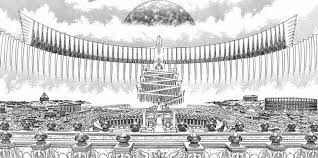

Falconia is a large urban metropolis of inhuman scale ruled under the Godhand Griffith and Queen Charlotte while Elfhelhm is small rural village under the Fairy Storm Queen and Archmage Gedfring.
Falconia is made up of giant stone edifices while the buildings of Elfhelm are woven from tree branches and other natural materials incorporated into trees. The massive spirit tree that separates the Astral and Material planes rests in the center of Elfhelm while the World Tree formed from a slain Ganeshka, merging the Astral and Physical planes, forms the center of Falconia.
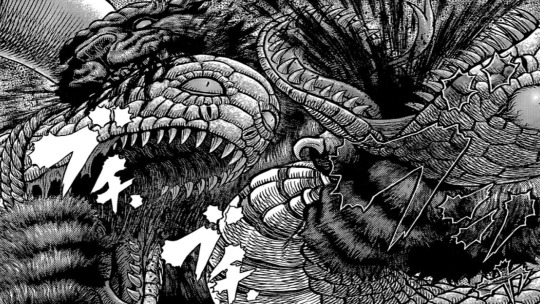

The differences between the two locations are war and peace. War is the state of Falconia with Griffith waging war against the magical creatures of the Astral World while the human community on Elfhelm lives in peace alongside the many astral creatures. The inhabitants of Elfhelm live in isolation and peace and while they have a field of scarecrows armed with scythes, enchanted pumpkin monsters and giant wicker man, it is purely defensive in nature with the village being a school for young sorcerers to learn magic. It is also where Casca is taken to be healed. By contrast, in Falconia Griffith’s foreign policy is one of invasion and conquest, and it is where Apostles learn to improve their fighting skills by battling monsters in the Pandemonium. The last detail shows the dark heart that exists at the center of Griffith’s vision.
The mission of the sorcerers of Elfhelm is “to safeguard the land and maintain equilibrium between our realm and the Astral World” while Griffith’s mission is to undo all that.
Elfhelm is clearly inspired by Avalon of Arthurian legend, an island of witches ruled by a fae sorcereress and healing while Falconia is inspired by Pandemonium, the capital of Hell in Paradise Lost with it’s inhuman scale, temple-like structure, pilasters and Doric pillars led by a king of demons. The essence of Elfhelm is cooperation and coexistence making it a paradise while the essence of Falconia is domination making it a dystopia under the guise of paradise.
32 notes
·
View notes